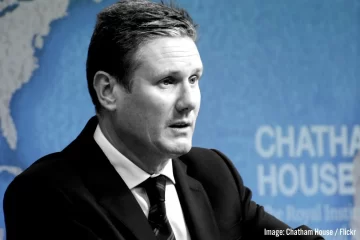The development of class consciousness is of prime interest to Marxists. As the current strike wave picks up pace, workers are being politicised on a higher scale. Ted Grant said “not a wheel turns, not a lightbulb shines without the kind permission of the working class. Once this enormous power is mobilised, no force on earth can stop it”. Despite this, a mood of pessimism plagues the left. Marxists have complete optimism; not in the idea that capitalism can change, but that the working class can overthrow this decrepit system.
Amongst young people, support for capitalism is at an all-time low. The simple fact is, young people have never seen capitalism in anything other than chaos. This has created a generation who are open to a revolutionary alternative.
According to research conducted by the right-wing Institute of Economic Affairs (IEA), 67% of Generation Z would like to live in a socialist economic system. 75% see capitalism as responsible for climate change, and 78% blame capitalism for Britain’s housing crisis.
While defenders of capitalism dismiss youth radicalism as a phase that will be grown out of, the IEA report found little difference in the attitudes of late teens and those in their early 40s. It concludes that “it is no longer true that people ‘grow out’ of socialist ideas as they get older”. This comes as no shock now that ‘growing up’ means simply facing more of capitalism’s crisis.
Among 16 to 23 year olds in the US, support for socialism jumped by 9 per cent between 2019 and 2020 alone. From 2020’s BLM protests to the unionization of Amazon workers, the ‘belly of the beast’ has become a hotbed for radical ideas.
The mouthpieces of global capital, including publications like the Financial Times and bourgeois think tanks, are growing increasingly worried about this radical mood. The IEA report even warns that “supporters of capitalism should… take ‘Millennial Socialism’ far more seriously than they currently do”.
The Pessimism of Left Leadership
Despite it being clear that more and more people are looking towards socialism as an answer, the left is plagued by pessimism.
On the student front, subjective ideas emanating from academia deny the existence of objective truth. This is having a paralyzing impact, as students are taught that we can neither understand nor change the world around us.
As far as any exists, the leadership of the left is moderate and reformist. Under Sir Keir Starmer, the Labour party has been transformed into a safe channel for capitalist interests.
Despite their good intentions, MPs to the left of Starmer, like Zarah Sultana and Nadia Whittome, are hangovers of the Corbyn movement. Like Alexandria Ocasio-Cortez in the US, these figures shroud reformist policies in radical language, generally failing to go beyond a call to tax the rich.
Even Mick Lynch, Dave Ward and other union leaders, have had their limitations exposed. The RMT and CWU canceled strikes due to the Queen’s death, causing backlash from members.
Leaders who seek reforms within the capitalist system, are unable to see beyond the current state of things. This is at odds with the rank-and-file and the youth, who are increasingly favouring an overthrow of the whole system – rather than tinkering around the edges. Based on short-sighted pessimism, left leaders are forced to make compromises with bosses and the right wing. We saw this throughout the Corbyn years of the Labour party.
Despite the left having the leadership and a significant membership base on their side, constant compromise was made to appease the right wing, eventually ending in Corbyn’s resignation after the General Election defeat.
Witnessing the narrow reformism of leaders can demoralise young people and radical workers. Living in an epoch of capitalist crisis without a clear route of escape, is what leads to a general mood of pessimism on the left.
While reformist leaders struggle to see a way out on the basis of capitalism, Marxists are based on something else entirely: the history of the class struggle. This reveals the immense potential of the working class. This perspective is the source of revolutionary optimism and the basis for the effective and energetic action that is so urgently needed!
The dialectical process of revolution
The Russian Revolution shows how quickly a revolutionary movement can develop. The revolution in 1905 failed. Lenin described this as the ‘dress rehearsal’, as by 1917, the mass of peasants and workers had experienced crises, war, and revolutionary upheaval, which transformed consciousness.
In February, the Bolshevik party numbered 8,000 in a population of 150 million. By October, they had grown to 250,000 and were able to lead millions in the struggle to remove the Tsarist autocracy in favour of workers’ power and a nationalised, planned economy.
While a revolutionary situation can develop quickly, growth isn’t linear. It’s best understood as a series of struggles and counter-struggles, which propel events forward and determine how they take shape. In the words of Lenin, “there are decades where nothing happens; and there are weeks when decades happen”. In tumultuous periods like the present one, consciousness can develop in leaps and bounds in response to events.
As the example of Russia in 1905 and 1917 shows, movements once defeated may emerge on a stronger basis. Key moments of exposition can once again lift the lid on the anger bubbling in society. It is through the class struggle that the consciousness of workers changes. They move, in the words of Marx, from “a class in themselves to a class in and for themselves”.
How consciousness develops
Through the experience of a picket line or a strike committee, workers can quickly become aware of their power. The development of class consciousness can propel workers forward, as happened with the General Strike of 1926. Union leaders, attempting to curtail the strike, called it off despite workers’ militancy growing.
In fact, two days after the general strike had been officially called off, there were 100,000 more on strike! Rank and file workers organised amongst themselves to stop the complete defeat of the strike. Rather than through books or texts, it is, practical experience that arms workers with knowledge of the class struggle, and where power lies in society.
In the heat of struggle, workers overcome prejudices pushed down on them by class society. We are told that these divisions are incurable, that they are natural in humanity. However, history has proven this wrong.
During the Miners’ Strike, the position of miners’ wives was transformed. Speaking of her husband, Brenda Proctor sums this up:
“He’d be picketing, and would come home to look after the kids while I went to meetings… Miners had a new respect for women.”
Similarly, the recent struggle in Sri Lanka has seen workers unite across ethnic divides. Tamil tea plantation farmers linked up with students, lawyers, healthcare workers and more to demand that all 225 MPs ‘must go’. For decades, British imperialism stoked division between religious groups in Sri Lanka. In the few short months of revolutionary upheaval, these divisions dissipated.
Workers, on the basis of events themselves, understand that in order to win they must have unity. Instead of buying into fighting each other, workers turn their anger to the real enemy: the capitalist class.
The Future of the Movement
Energy bills are skyrocketing; inflation continues to rise; the crises in healthcare, housing and education are only going to worsen. In response, there’s a tidal wave of class struggle on the horizon.
We’ve seen the unionisation of previously ‘unorganised’ sectors, from Amazon and Starbucks workers in the US to food delivery drivers here in the UK.
The recent RMT strike indicates a radicalisation of the labour movement. The class language being used on picket lines and in Enough Is Enough rallies shows the appetite for class war from workers.
Students today face a whole host of problems, from poor housing and a bad education to mounting debt and uncertain career prospects. Unsurprisingly, the radicalization of young people will only intensify as conditions worsen.
Scandals are plaguing all of the institutions of the ruling class, from the police to the monarchy. The traditional weapons of the bourgeois state are being discredited, particularly in the minds of the youth. Whether the leadership can keep up or not, at a certain point, the masses will move. Success depends on our ability to learn the lessons of history and avoid the defeats suffered in the past.
Marxists have no illusions that this will be an easy struggle, the birth of a new system is no small task. We do, however, have complete faith in the strength and power of the working class. We are seeing the beginning of the revolutionary potential which exists in society.
Our job as Marxists is to harness this potential and smash the barbarous system we see around us today!



